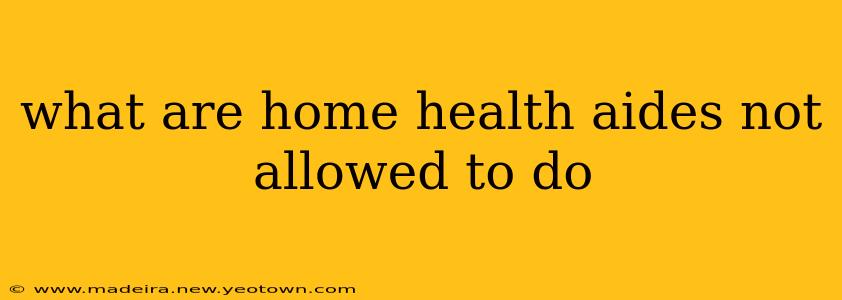What Home Health Aides Are Not Allowed To Do: Navigating the Boundaries of Care
The role of a home health aide (HHA) is crucial in providing vital support and assistance to individuals needing help with daily living activities. However, HHAs operate within a clearly defined scope of practice, and exceeding those boundaries can have serious consequences. This isn't just about following rules; it's about ensuring the safety and well-being of the clients they serve. Let's delve into the specifics of what HHAs are not allowed to do.
This isn't a comprehensive list applicable to every state and situation, as regulations can vary slightly. Always refer to your state's specific guidelines and your employer's policies.
What are the limitations on administering medications?
This is a critical area. Generally, HHAs are not allowed to administer medications, even over-the-counter ones, unless explicitly stated in their job description and approved by their state's licensing board and the patient's healthcare provider. This includes oral medications, injections, and topical applications. This restriction is in place because medication administration requires specialized training and understanding of potential drug interactions and side effects. Improper medication administration can have serious health consequences for the client.
Can HHAs perform medical procedures?
No. HHAs are not qualified to perform any medical procedures. This includes wound care beyond basic cleaning (as per training and instruction), inserting catheters, drawing blood, or changing intravenous lines. These tasks require specialized medical training and licensing beyond the scope of an HHA's certification. Attempting such procedures could lead to serious injury or infection for the client and legal repercussions for the HHA.
What about providing medical advice or diagnoses?
HHAs are not allowed to provide medical advice or diagnoses. Their role is to provide personal care and support, not to interpret symptoms or recommend treatments. If a client expresses concerns about their health, the HHA should immediately report these concerns to the supervising nurse or the client's healthcare provider. Giving unsolicited medical advice could be harmful and potentially life-threatening.
What are the limits on physical assistance?
While HHAs provide significant physical assistance, there are limits. They are generally not allowed to lift or move clients beyond their physical capabilities without proper training and equipment. This is crucial to prevent injuries to both the client and the HHA. Using proper lifting techniques and requesting assistance when necessary is paramount. They should also never perform tasks that require specialized training, such as physiotherapy exercises without proper supervision.
Can HHAs handle financial matters for clients?
Absolutely not. HHAs are not authorized to handle a client's finances in any way. This includes managing bank accounts, paying bills, or handling money for the client. This is a critical boundary to prevent financial exploitation and maintain ethical professional conduct.
What about driving clients?
Transportation arrangements vary by job description and agency policy. Some HHAs may be permitted to transport clients if explicitly approved and trained. However, this often involves strict adherence to regulations about vehicle safety, insurance, and licensing. Always check your employer's specific policies and local regulations.
What happens if an HHA violates these boundaries?
Consequences for exceeding the scope of practice can be severe, including:
- Loss of certification or employment: Violation of regulations can lead to the revocation of an HHA's certification and immediate termination of employment.
- Legal action: In cases of negligence or harm caused by exceeding the scope of practice, HHAs may face legal action, including lawsuits and criminal charges.
- Disciplinary action: Depending on the severity of the violation, disciplinary action may be taken by the employing agency or licensing board.
The role of a home health aide is demanding and rewarding, but it's crucial to remember that operating within the defined boundaries of practice protects both the client and the HHA. Strict adherence to guidelines ensures safe and ethical care.

